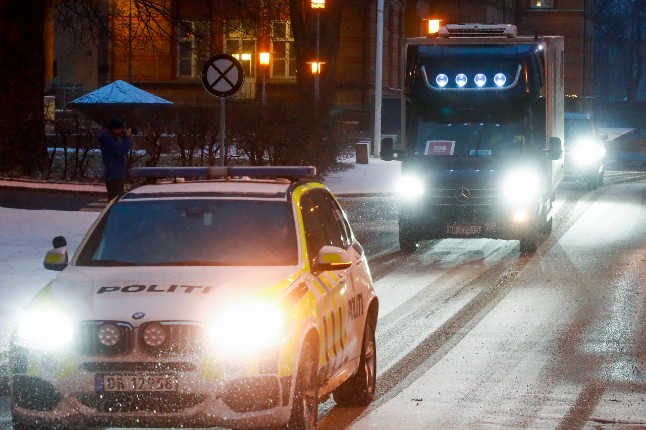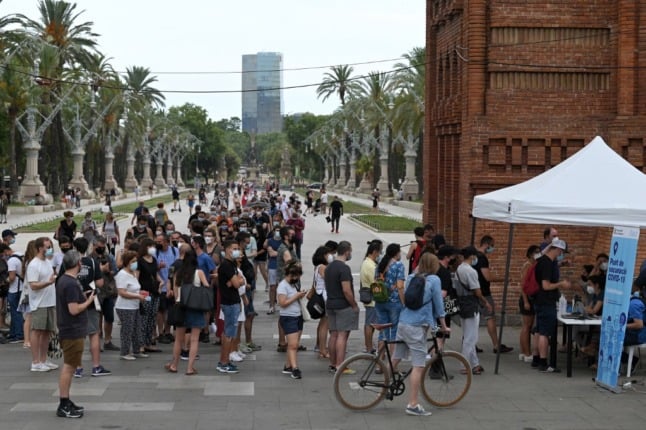- UPDATE: European Union officially approves Pfizer vaccine for rollout
- Coronavirus: Sweden set to start vaccinations on December 27th
- Covid-19: What's Sweden's priority list for the vaccine?
VACCINE
First doses of Pfizer’s Covid-19 vaccine arrive in Sweden
Sweden's first doses of the Pfizer-BioNTech coronavirus vaccine arrived early on Saturday, with the doses set to be driven during the day to each of the country's 21 regions ahead of the first vaccinations on Sunday.
Published: 26 December 2020 09:58 CET

Police escort a truck carrying the Pfizer vaccine in Norway. Photo: Terje Pedersen/NTB
According to a press release from the Public Health Agency of Sweden, the first delivery had gone “according to plan”, with the vaccine parcel repacked for the regions.
“It feels good that we have now reached this step and that we in Sweden can within a few hours begin offering protection against Covid-19,” Anders Tegnell, Sweden's state epidemiologist, said in the statement.
READ ALSO:
This weekend, Sweden will only receive 9,750 doses, enough to vaccinate 4,900 people, with regions likely to receive a second delivery over the New Year. eventually, Sweden expects to receive 80,000 doses a week.
According to the agency, it is working “intensively” with the 21 regions which run Sweden's health system day-to-day and with the Swedish Association of Local Authorities and Regions (SKR).
According to the agency, the first doses would be offered to those “who have the greatest need of protection”, for example, those who live in elderly care homes.
The European Medicines Agency (EMA) approved Pfizers/Biontech's vaccine on Monday, opening the way for doses to be sent out to member states.
Och redan i dag får Sverige 9 750 doser av vaccinet i en första leverans och i vissa regioner inleds vaccineringen redan under söndagen. Då vaccinet ges i två doser per person kommer denna inledande levervens att räcka till strax under 5 000 personer.
Url copied to clipboard!


 Please whitelist us to continue reading.
Please whitelist us to continue reading.
Seems like you forgot to translate the last paragraph.
I’m curious as to how the authorities are doing their calculations.
Sweden’s population is 10 million.
From wikipedia, there’s approx 7 million adults who would need vaccinations. Approx 2 million are above the age of 65.
Vaccinating 2 million people at a rate of 80,000 a week would take 25 weeks. Which means that process would be completed in roughly 6 months (this doesn’t take into consideration the second dose needed).
This still leaves approx 5 million adults to be vaccinated.
How do the authorities reach the conclusion that all adults in Sweden will be vaccinated by the first half of 2021?
I’m curious as to how the authorities are doing their calculations.
Sweden’s population is 10 million.
From wikipedia, there’s approx 7 million adults who would need vaccinations. Approx 2 million are above the age of 65.
Vaccinating 2 million people at a rate of 80,000 a week would take 25 weeks. Which means that process would be completed in roughly 6 months (this doesn’t take into consideration the second dose needed).
This still leaves approx 5 million adults to be vaccinated.
How do the authorities reach the conclusion that all adults in Sweden will be vaccinated by the first half of 2021?